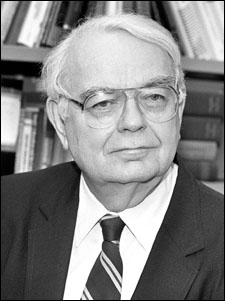Founder of Harvard’s Statistics Department, Frederick Mosteller, dies
Work influential in public health, education
Pioneering statistician Frederick Mosteller, a retired Harvard professor whose broad-ranging work influenced public health, medicine, education, and even American history, died Sunday (July 23) at age 89.

Mosteller was influential in the founding of Harvard’s Statistics Department in 1957 and served as the department’s first chairman. He went on to chair three other departments at Harvard, a feat that remains unmatched.
Friends and colleagues hailed Mosteller as a pioneer in his field, a caring teacher, and one of the most influential statisticians of his time.
In a notice to the members of the Harvard School of Public Health community, Dean Barry Bloom credited Mosteller with transforming the School’s Department of Biostatistics into one of the top such departments in the world. He called Mosteller “a giant in his field” and a “major force in statistics teaching at all levels.”
“He is still referred to in discussions of statistical and epidemiological issues as setting the intellectual gold standard,” Bloom said.
Mosteller spent the early years of his Harvard career in the Faculty of Arts and Sciences, chairing the Department of Social Relations and the Statistics Department, the latter for 15 years on three different occasions. In the late 1970s, he became chairman of the Harvard School of Public Health’s Department of Biostatistics, subsequently also chairing the School’s Department of Health Policy and Management.
He retired in 1987. Though he left his daily teaching duties, Mosteller continued working, serving as director of the Technology Assessment Program at the Harvard School of Public Health and as chair of the Center for Evaluation in the American Academy of Arts and Sciences’ Initiatives for Children program, which analyzed the effectiveness of educational programs aimed at children and youth.
Stephen Stigler, chairman of the University of Chicago’s Statistics Department and a longtime friend, said Mosteller worked tirelessly “building bridges between academic statistics and the broader world,” and was “universally admired and respected as the senior statesman of our field.”
“He had superb statistical judgment and a knowledge of our science that was both broad and deep. With his finely honed social conscience, this made him one of the most effective statisticians in the world over the past half-century,” Stigler said. “We shall miss him greatly.”
Xiao-Li Meng, chair of Harvard’s Statistics Department, called Mosteller’s contribution to the department and to the statistical community “unmeasurable” while Jeremy R. Knowles, dean of Harvard’s Faculty of Arts and Sciences, referred to Mosteller as a scholar, teacher, and admired member of Harvard’s community.
“Professor Mosteller was a founding figure in Harvard’s Statistics Department, a prolific scholar and generous advisor to students, a leader in introducing statistics into American secondary education, and an admired and intellectually eclectic citizen of the University,” Knowles said. “He was, simply, a wonderful man.”
Mosteller was born in West Virginia in 1916 and spent his teenage years in Pennsylvania. He attended the Carnegie Institute of Technology, now Carnegie-Mellon University, earning bachelor’s and master’s degrees in mathematics. He continued his graduate studies at Princeton University, receiving a master of arts degree in 1941 and a doctorate in 1946. He began his Harvard career that same year, as a lecturer in the Department of Social Relations.
In 1948, Mosteller assisted in one of the first large, multi-center evaluations in public health and one of the first collaborations between statisticians and physicians. The National Halothane Study examined the effects of an anesthetic suspected in the deaths of several patients. It covered 34 institutions and 865,000 patients, finding no evidence that halothane posed a higher risk than other anesthetics. It was one of the early uses of both biostatistics and a large mainframe computer for statistical computing.
Mosteller would go on to apply statistics to a wide variety of subjects, including the effectiveness of different surgical techniques, the treatment of patients with myocardial infarction, and the importance of family income and of smaller class sizes in educational success. Mosteller collaborated with Daniel Patrick Moynihan, then a Professor of Government at Harvard, on the influential 1972 report “Equality of Educational Opportunity.” He produced other classic statistics texts with his lifelong collaborator and friend, John Tukey of Princeton.
Bloom credited Mosteller’s work in meta-analysis, or the study of other studies, with adding another weapon to the public health “statistical armament,” allowing risk factors and other results to be gleaned from different data sets.
In 1962, Mosteller and colleague David Wallace from the University of Chicago conducted a statistical analysis of the language of 12 Federalist Papers, written anonymously during the country’s founding, urging ratification of the Constitution. Either James Madison or Alexander Hamilton was thought to be the author of the 12 papers. Mosteller and Wallace concluded from analysis of sentence length and the use of certain words that Madison was the author.
The author of more than 300 journal articles and editor, author, or contributor to dozens of books, Mosteller was a prolific writer. He earned numerous awards and honors, including honorary degrees from the University of Chicago, Carnegie-Mellon University, Yale University, Wesleyan University, and Harvard.
Mosteller is survived by his son, William, his daughter, Gale Mosteller, an economist who collaborated with him, and his grandson, Hobart Reynolds.
Visiting hours will be held July 27 from 7 p.m. to 9 p.m. at the Arlington (Virginia) Funeral Home, 3901 North Fairfax Drive. A memorial service is planned for later this year but has yet to be scheduled.




